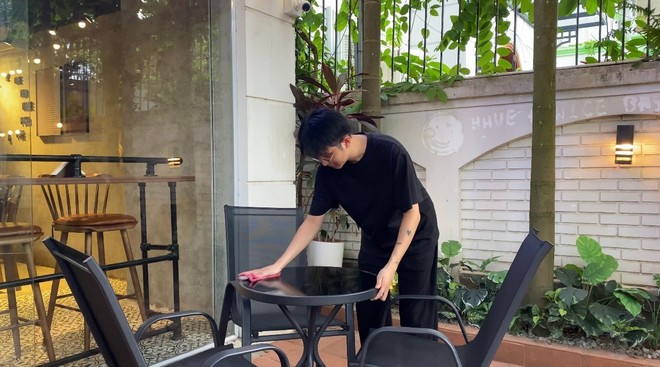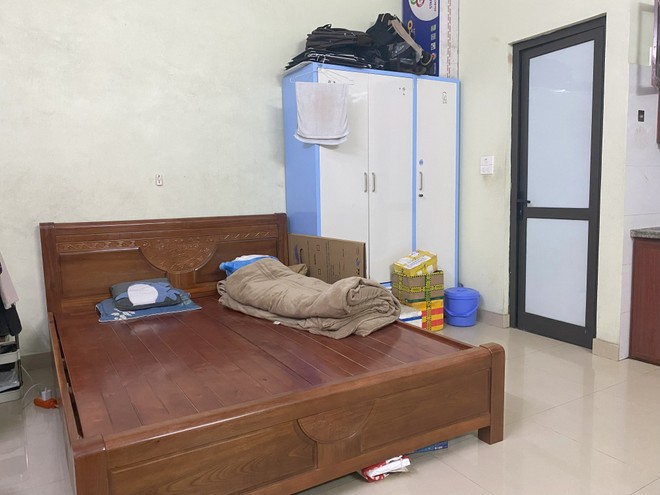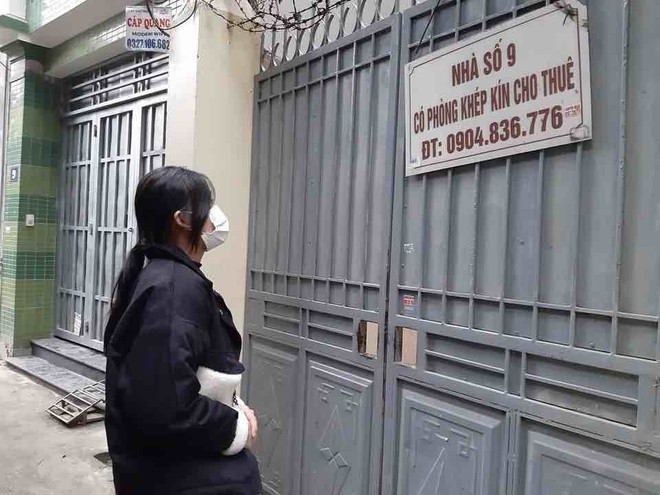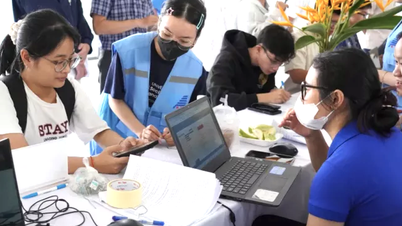
The price of renting a room in Hanoi is constantly increasing, the cost of living is beyond the support of the family, making many students fall into a difficult situation. In this context, a rather new model: "Exchanging work for accommodation" - working without pay in exchange for free accommodation is emerging as a way out of the situation.
Owner and tenant 'manage together'
According to records, many coffee shop owners, small restaurants, even homestays, nail salons, etc. have proactively proposed the model of "accommodation - work exchange" with students. Mr. PNĐ.K, the owner of a coffee shop in Dong Da, said that his coffee shop is often short of staff during the evening and weekend shifts, while the cost of hiring more staff is expensive. He came up with the idea of letting students stay at his shop in empty rooms, while they can pay for their accommodation by working overtime.
Mr. K. said that assuming a room costs 3.5 million VND, students have to work an average of 80-100 hours per month in exchange for accommodation. If converted to the common part-time salary (~20,000 VND/hour), the amount of effort spent is equivalent to 2 million VND. This means that students are "paying" less than the actual value of the room.
“A friend of mine who owns a small restaurant has also applied this model. I found it reasonable and helpful for students, so I followed suit. It is beneficial for both sides: I don’t have to hire night shift staff, and the students have a place to stay so they don’t have to worry about rent. Every month, I still support them with an additional 500,000 to 1 million VND to encourage them,” Mr. K added.

Nam, a second-year English student at a university on Tay Son Street (Dong Da, Hanoi), is one of those who accept to “trade work” for a place to stay. After school, every evening he busies himself cleaning tables and serving customers at the coffee shop. In return, Nam gets to stay for free on the third floor of the shop, with air conditioning, wifi and hot water.
“The rent is too high now, I can’t live alone. Sharing a room is cramped and inconvenient. Working at the shop and staying here saves time and reduces the worry of rent,” Nam confided.
Similarly, working as a waiter at a barbecue restaurant in the evening has been The Anh’s job for the past two months, a third-year student at Hanoi University. “The work is quite hard, sometimes I have to work until late at night. But in return, I save nearly 4 million VND on rent, food and books. Otherwise, I would have to work many other jobs at the same time to make ends meet,” The Anh shared.

However, this model also has many potential risks as it mostly takes place on the basis of verbal agreements, without labor contracts, without job descriptions, without standard break times, and without occupational safety and hygiene regulations. When disputes arise, students are often in a weak position.
Anh Thu worked part-time at a nail salon, initially agreeing to work 5 days a week in exchange for a shared dormitory upstairs. After two months, the owner used the excuse of “too many customers” to ask her to work overtime on weekends and stay until 11:30 at night. She refused because it clashed with her class the next morning, and was told “if you can’t do it, move somewhere else”. “I was forced to leave in the middle of peak season to find a room and bear all the extra costs”, Thu said sadly.
The storm of rising accommodation prices weighs heavily on students' shoulders
Not only the above students, thousands of students in Hanoi and Ho Chi Minh City are facing a difficult spending problem. The mid-year report 2025 from Batdongsan.com.vn shows that the rental price of affordable rooms near universities has increased by 18 - 25% compared to the same period in 2024.
According to a survey, since the beginning of September in Hanoi, a 15 m2 room in Dong Da area costs 3.5 - 4.2 million VND/month; a 20 m2 private room in Cau Giay, Thanh Xuan ranges from 4 - 5 million VND; Hai Ba Trung district has jumped to 5 million - the highest level in the past 4 years. Besides, this is only the rental price, not including electricity, water and other services.
Meanwhile, most students only receive 3-4 million VND/month in support from their families, nearly half the minimum cost.

Mr. Tuan Tu, a broker at a real estate rental company, said that many landlords started raising prices from August and early September and will continue to increase them when new students start school. Rooms near the school and fully furnished are often prioritized by parents, so prices fluctuate constantly. After October, when demand stabilizes, prices will cool down and the market will have more options.
When the rent is no longer affordable, seemingly spontaneous solutions such as “exchanging labor for accommodation” have become practical options. This is both a testament to the spirit of perseverance and a reflection of the harsh survival pressure of young people in the midst of price storms.
This model helps both sides manage: the shop owner saves on staff, the student reduces financial pressure. However, most agreements are verbal, without a labor contract. When disputes arise, students are often in a weak position, even at risk of being exploited if the workload increases without their rights being guaranteed. This is also the reason why many young people are hesitant, considering this only a temporary solution.
For this form to be truly sustainable, it needs the support of universities, student organizations and local authorities. Piloting a model of community dormitories linked to businesses - where work shifts, study hours and accommodation conditions are standardized - will help reduce dependence on verbal agreements. An anonymous feedback mechanism, along with a commitment to quickly handle any signs of abuse, is a fulcrum for students to feel secure in participating.
Ultimately, a roof over the head should not be such a high price that students have to pay in terms of effort, risk, and uncertainty. With a minimum of protection, the “work for housing” model is truly a temporary lifeline, not a rope that forces young people to choose between housing and their educational future.
Source: https://baolaocai.vn/doi-cong-lay-cho-o-cach-muu-sinh-moi-cua-sinh-vien-giua-con-bao-gia-nha-tro-post881597.html


![[Photo] Hanoi morning of October 1: Prolonged flooding, people wade to work](https://vphoto.vietnam.vn/thumb/1200x675/vietnam/resource/IMAGE/2025/10/1/189be28938e3493fa26b2938efa2059e)


![[Photo] President of the Cuban National Assembly visits President Ho Chi Minh's Mausoleum](https://vphoto.vietnam.vn/thumb/1200x675/vietnam/resource/IMAGE/2025/10/1/39f1142310fc4dae9e3de4fcc9ac2ed0)
![[Photo] Keep your warehouse safe in all situations](https://vphoto.vietnam.vn/thumb/1200x675/vietnam/resource/IMAGE/2025/10/1/3eb4eceafe68497989865e7faa4e4d0e)


























































































Comment (0)